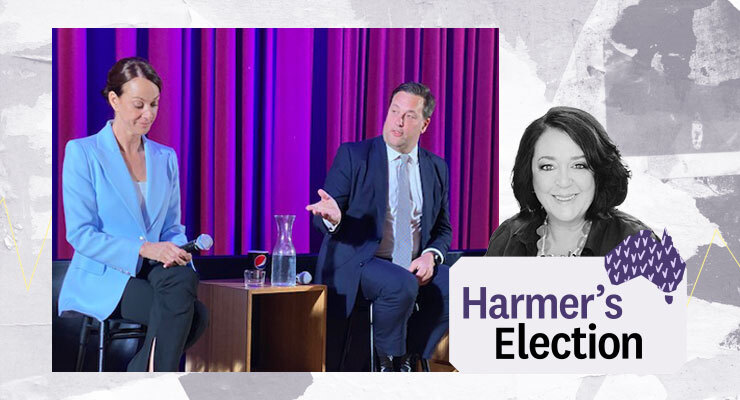
It must have been daunting from the candidates’ point of view — five of them perched on stools facing a capacity crowd of 200 in Avalon cinema who were, literally, passing buckets of hot popcorn.
However, if the audience was expecting a fiery sequel to the shambolic Nine Network’s leaders debate the previous evening, moderator Geraldine Doogue, the redoubtable ABC broadcaster, was having none of it.
The tone for last night’s debate was set early and firmly. This wouldn’t be like that “other debate”, said Doogue. Candidates would have time to state their case, ask one question of another panellist, and then answer pre-submitted questions from the audience, “and I will be keeping time, I promise you. Here’s my clock!”
She kept a tight rein on proceedings with an insistent “ding” of pen on water glass, or a crisp command to “Get back on track, please” when any speaker, even momentarily, strayed from the rules.
For their part, the candidates responded to each other with sometimes excruciating politeness: “After you.” “No. After you.” “I’m sorry. I thought you’d finished.” “Please continue.”
There were a few flashpoints over the need for a federal ICAC and accusations of dubious campaign funding which elicited applause or incredulous laughs but overall it was a relaxed, dignified affair. You could almost hear the sigh of relief from the candidates when they climbed off their uncomfortable perches after almost two hours.
Not every “town hall” is able to attract a moderator the calibre of Doogue. So how did the host of ABC RN’s Saturday Extra “with a focus on international affairs and business” broadcasting to a national audience find her way to a small cinema in Avalon discussing the state the local roads and hospitals in the fascinating campaign for Mackellar?
The answer lies with Pulitzer-prize winning, former investigative journalist for The New York Times and The New Yorker Ray Bonner. After a tour of duty chasing cocaine generals in El Salvador, covering the war in Bosnia, the Rwandan genocide and Bali bombings and living in every continent (bar Antarctica), he bought the Avalon bookshop Bookoccino.
How the now 80-year-old Bonner ended up in Avalon owning a modest bookshop is a tale for another time, but he’s determined to turn his small cafe venture into the “Wheeler Centre of the north”.
I’ve spoken to Bonner a few times and he marvels that all his events are sold out — even with a ticket costing $70: “Sometimes they even bring their own folding chairs with the price tags still on them!”
He says the local citizenry “shouldn’t have to cross the Harbour Bridge to be informed”.
Bonner’s public forums, “Bookoccino Talks”, have included high-profile names including Geoffrey Robertson, Ben Quilty, Kate McClymont, Leigh Sales, Richard Fidler, Julia Baird, Marian Wilkinson, Tim Flannery, Mike Cannon-Brookes and Paul Kelly (the journalist one), all making the 40km trip north from the Sydney CBD.
One recent event was billed as “Former New York Times China bureau chief Jane Perlez debates China with acclaimed journalists Chris Buckley and Richard McGregor. Will there be war? Is Australia’s policy on China too hard, or too soft?”
In February Doogue hosted an event “to stimulate your political citizenry with a conversation on the origins, intentions and future of democracy” with political philosopher John Keane.
A rich diet for the sleepy beachside village, but Bonner says “there’s a real hunger here for engagement” even as he acknowledges the populace as “upper middle-class and white”.
Maybe he’s on to something? Things are changing in this part of Mackellar, which has been blue-ribbon Liberal for the past 73 years. Recent indications say it will be close run, despite needing a swing of 13.3% to change hands.
Speaking after the debate, Doogue echoes that sentiment. She’s a Warringah voter from further south, but holidays in this part of the world and is “struck by the energy here. It’s extraordinary.”
The engagement of voters in Warringah is “staggering”, but she detects something extra in Mackellar: “There’s a real joyousness here. A delight in getting in there. It started in 2020 with Bookoccino being such a hub, and then the colours came out.”
As for the Nine debate, Doogue says she “wanted it to work better than it did” and tech glitches notwithstanding (she understands those) she felt it had a “slightly tedious quality. I’m exceptionally engaged and available, but I found myself switching on and off a couple of times.”
She had already determined last night would be different from the usual combative event and she admits to a tussle on the approach with Bonner who advised: ”Get in there. Nail ’em.”
But she’s been thinking about this for a while and, wearing her international affairs hat, saw the gathering as ”exceptionally invigorating for democracy”.
“French politics is utterly bedevilled by centralism, British politics is too,” she said. “It used to be said of the voting public: ‘Oh my God, if they all come out you can’t control them. They’ll all go feral.’ No! The more you get people involved the more responsible and intelligent they get.”
So… to proceedings.
It’s the only public forum Mackellar incumbent Jason Falinski has agreed to speak at (for now, at least), while the United Australia Party wannabe was not present.
“Your best hope and biggest concerns?” was the question set by Doogue. “I’d like to get away from ‘biggest fears’ which seem to dominate our lives these days.”
Labor candidate Paula Goodman was up first and nominated The Female Eunuch by Germaine Greer as “changing her life”. She’s about women’s equality and resilience. Overdevelopment in this glorious part of the world is also a concern. (Also of concern is her caveat: “Don’t quote me on that.”)
Independent Dr Sophie Scamps’ key issue was “getting on track for climate action”. The catastrophic “Black Summer” bushfire season of 2019-20 was her siren call: ”Climate change has already arrived!”
Falinski cited his work in government on home affordability policy and longed for “a nation where we don’t rely on a government to show us care and compassion because we already receive it from our friends, family and neighbours”.
Greens hopeful Ethan Hrnjak declared a pox on all houses for not doing enough to reduce emissions. He wants a 75% target. Also a federal ICAC with retrospective powers, thank you.
The New Liberal’s Barry Steele is committed to a signing “treaty or treaties” with First Nations peoples. They need a voice in Parliament. He’s also an advocate for modern monetary theory. Quite the menu.
It was a good hour after finishing their choc tops before the audience finally got something to get their teeth into, and that’s the retrospective nature of a proposed federal ICAC. Falinski asserted lives and careers have been ruined by the NSW ICAC because of “mistakes”. Scamps retorted: “They’re not ‘mistakes’; they’re corruption.”
That gets the cheers!
“Thank you all,” said Doogue, wrapping up. “You get people engaged and they start to realise the complexity of the community they’re involved in. They start to really tailor their thoughts. They still have their dreams, but they’re more relevant and complex.
“What I’ve watched in Warringah and Mackellar has just astonished me. The ones who are sullen and disengaged are the ones who we have to worry about. Can’t see too much of that here.”








Hmmm. Jason Falinski did no work of substance on “housing affordability”. He chaired a Committee, but the output trumpeted the Coalition line and inherent in Falinski’s prattle at the time were no solutions. I find housing affordability a really, really interesting issue. We now hear, daily on repeat, about cost-of-living inflation, but we never hear housing price increases described as “inflation”. We don’t hear anything about asset price increases, which have generally been of a staggering magnitude over the last decade at least in the the context of them being inflationary. One of the great bits of Coalition deception is to label wage rises as inflationary, but to think that increases in profits aren’t. Granted, increases in nominal profits due to inflation aren’t inflationary per se, but where worker productivity rises and wages don’t, that extra productivity creates higher profits that go to the owners of capital – and the owners of capital tend to buy more capital assets, thereby pushing up prices. $280.0 million for an Andy Warhol painting, $2.0 million for a very early Victorian number plate (no 14) – tell me I’m not right. Despite claiming credit for low inflation, mostly the result of a total lack of fiscal stimulus by the Coalition, which had been pushing the economy into recession pre-Covid, including under Morrison as the treasurer, Morrison insists higher inflation isn’t his fault, suggesting he really doesn’t have any idea how the economy works. Housing price INFLATION has pushed houses out of reach of many but apparently that inflation is good (because it makes home owners more likely to re-elect an incompetent PM) but if the price of Cornflakes rise that is bad (because it makes Morrison less likely to be re-elected). Drivel or nothing on the former, loads of Morrison-esque piffle on the latter (here’s a hint – he doesn’t really care if the poor are struggling). Lots of noise on the former, nothing but drivel on the latter. All inflation usually impacts badly on those that tend to get left behind in real income terms – so why is not all inflation given equal prominence?
The chairman should not have to have the calibre of Geraldine Doogue to be effective. If most of the people present respect the rules of meetings and the chairman applies them, then quite hot disagreements can be heard out. Chairmanship should be part of the basic training of every junior administrator, and their routine duty. If chairing the meeting is left to the least invested member of the gathering, then the most senior members are all able to argue their points.
See what happens when women run the show. I could get used to this. No more BSDs.
Margaret Thatcher and Bronwyn Bishop sort of break that assumption…
Thatcher was staunch even if you didn’t like her politics. Bron started behaving like an entitled white boy. Where was the rules that said no helicopters. Who was responsible for the atmosphere of entitlement and privilege. As usual, reactionaries are a law into themselves.
And the channel 9 women who ‘chaired’ the weekend’s leaders debate
I think the prefix “channel 9” says it all. Ms Doogue has decades of experience as a seasoned broadcaster, with an organisation which develops its staff. I’m not sure how to describe Nine’s approach, other than noting that when it started 60 Minutes, it poached three men from the ABC.
Fortunately there are few women of that nasty calibre outside of conservative politics…in the present case the more progressive women in the next parliament the better, we will all be able to sleep better at night.